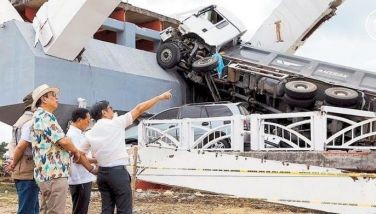PCGG sees award of $5-B FM assets
August 2, 2002 | 12:00am
The government expects to recover within a year up to $5 billion worth of ill-gotten assets of the late dictator Ferdinand Marcos.
After a 16-year global asset hunt and court battles that at times pushed the government’s efforts close to legal disaster, "it is not" a lost cause, Chairman Haydee Yorac of the Presidential Commission on Good Go-vernment (PCGG) said yesterday.
The Supreme Court has ordered the court trying one of the key cases to issue its verdict within six months, she added.
"I know that justice is very slow in this country, but it cannot be that slow," Yo-rac told the Foreign Correspondents Club in Manila.
Marcos was toppled in a bloodless revolt in February 1986, forcing him and his wife Imelda Marcos to abandon Malacañang and more than a thousand pairs of her shoes. The heirs returned to Manila after Marcos died in exile in Hawaii in September 1989.
Yorac said that of the estimated $10 billion Marcos and his cronies allegedly embezzled from state coffers during his 1966-1986 rule, Manila has recovered $2 billion worth through litigation or settlements with Marcos cronies.
The focus of her efforts now is on winning judgments on the three most important of about 700 civil cases, including one involving a fund the government contends is made up of taxes levied on farmers for coconut products during the Marcos regime.
"With respect to the coco levy funds, and with respect to the monies deposited in the name of five or six Swiss foundations in Switzerland, I’m giving you a timetable between end of the year up to middle of next year," Yorac said.
"PLDT, probably the same," she added, referring to Manila’s claim on a holding firm that in 1998 sold a 21 percent stake in dominant carrier Philippine Long Distance Telephone Co. to Hong Kong’s First Pacific Co. Ltd.
As a rule, Filipino judges do not comment on pending cases. The Marcos heirs were unavailable for comment yesterday.
Manila is not ruling out an out-of-court deal, but the Marcoses have not come forward with an acceptable offer, Yorac said.
The so-called "coco levy" fund is managed by the United Coconut Planters Bank, sequestered by the government from a Marcos crony in the 1980s, and which in turn controls a 27 percent stake in top Philippine brewer San Miguel Corp.
The other case involves $700 million worth of funds allegedly salted away by the Marcos family in numbered Swiss bank accounts.
The Swiss courts have moved these funds to an escrow account in Manila to await final judicial ruling here on their ownership.
Yorac estimated the three assets at "between $4 billion to $5 billion," making up the bulk of the disputed estate of Marcos.
For the other civil cases against the Marcos parties, Yorac should be able to present the state’s evidence within two years.
Yorac said that when she took over the PCGG a year ago, she found to her horror that its records "were in complete disarray" with "many documents" vital to the cases "found to be missing."
The government only had 12 "part-time lawyers" who were paid P24,000 a month "litigating 37 banner cases" against the best Manila attorneys money could buy.
She said she also suspected corruption. The government found out last year that some of the missing documents had turned up at the home of a previous commissioner, who she did not identify.
"We were all really surprised. If one chairman managed to bring documents to his house, there is a possibility that other chairmen did the same," Yorac added.
She said the PCGG is studying the criminal culpability of the former official. – Sheila Crisostomo
After a 16-year global asset hunt and court battles that at times pushed the government’s efforts close to legal disaster, "it is not" a lost cause, Chairman Haydee Yorac of the Presidential Commission on Good Go-vernment (PCGG) said yesterday.
The Supreme Court has ordered the court trying one of the key cases to issue its verdict within six months, she added.
"I know that justice is very slow in this country, but it cannot be that slow," Yo-rac told the Foreign Correspondents Club in Manila.
Marcos was toppled in a bloodless revolt in February 1986, forcing him and his wife Imelda Marcos to abandon Malacañang and more than a thousand pairs of her shoes. The heirs returned to Manila after Marcos died in exile in Hawaii in September 1989.
Yorac said that of the estimated $10 billion Marcos and his cronies allegedly embezzled from state coffers during his 1966-1986 rule, Manila has recovered $2 billion worth through litigation or settlements with Marcos cronies.
The focus of her efforts now is on winning judgments on the three most important of about 700 civil cases, including one involving a fund the government contends is made up of taxes levied on farmers for coconut products during the Marcos regime.
"With respect to the coco levy funds, and with respect to the monies deposited in the name of five or six Swiss foundations in Switzerland, I’m giving you a timetable between end of the year up to middle of next year," Yorac said.
"PLDT, probably the same," she added, referring to Manila’s claim on a holding firm that in 1998 sold a 21 percent stake in dominant carrier Philippine Long Distance Telephone Co. to Hong Kong’s First Pacific Co. Ltd.
As a rule, Filipino judges do not comment on pending cases. The Marcos heirs were unavailable for comment yesterday.
Manila is not ruling out an out-of-court deal, but the Marcoses have not come forward with an acceptable offer, Yorac said.
The so-called "coco levy" fund is managed by the United Coconut Planters Bank, sequestered by the government from a Marcos crony in the 1980s, and which in turn controls a 27 percent stake in top Philippine brewer San Miguel Corp.
The other case involves $700 million worth of funds allegedly salted away by the Marcos family in numbered Swiss bank accounts.
The Swiss courts have moved these funds to an escrow account in Manila to await final judicial ruling here on their ownership.
Yorac estimated the three assets at "between $4 billion to $5 billion," making up the bulk of the disputed estate of Marcos.
For the other civil cases against the Marcos parties, Yorac should be able to present the state’s evidence within two years.
Yorac said that when she took over the PCGG a year ago, she found to her horror that its records "were in complete disarray" with "many documents" vital to the cases "found to be missing."
The government only had 12 "part-time lawyers" who were paid P24,000 a month "litigating 37 banner cases" against the best Manila attorneys money could buy.
She said she also suspected corruption. The government found out last year that some of the missing documents had turned up at the home of a previous commissioner, who she did not identify.
"We were all really surprised. If one chairman managed to bring documents to his house, there is a possibility that other chairmen did the same," Yorac added.
She said the PCGG is studying the criminal culpability of the former official. – Sheila Crisostomo
BrandSpace Articles
<
>
- Latest
- Trending
Trending
Latest
Trending
Latest
Recommended




























